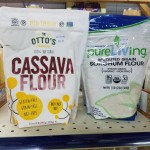
 You never know what you may find at the Nut and Pickle stand! There are some fantastic new products including this Cassava Flour and Spray on Herbs!!
You never know what you may find at the Nut and Pickle stand! There are some fantastic new products including this Cassava Flour and Spray on Herbs!!
1. Cassava flour is gluten, grain and nut-free
The cassava plant is a staple crop to millions of inhabitants in South America and parts of Asia and Africa. The plant produces the cassava root (also known as yuca or manioc), a starchy, high-carbohydrate tuber – similar to yam, taro, plantains and potato.
As a tuberous root vegetable, cassava is gluten, grain and nut-free, as well as vegan, vegetarian and paleo.
2. Cassava flour is not the same as tapioca flour
While sometimes the terms cassava flour and tapioca flour are used interchangeably, there are in fact distinct differences. Tapioca is a starch extracted from the cassava root through a process of washing and pulping. The wet pulp is then squeezed to extract a starchy liquid. Once all the water evaporates from the starchy liquid, the tapioca flour remains.
Alternatively, cassava flour is the whole root, simply peeled, dried and ground. This means it has more dietary fiber than tapioca flour – and allows me to make cassava flour tortillas, which would not be possible with tapioca flour.
3. Cassava flour is not poisonous
It’s true that the cassava root contains naturally occurring cyanide compounds (also found in almonds and spinach!) and that yes, they can be extremely toxic. But only if eaten raw. That’s why the traditional cultures who rely on cassava for sustenance have centuries old processes of soaking, cooking and fermenting. These processes remove the toxic compounds and prevent one from getting sick.
Rest assured that all commercially available cassava and tapioca flours do not contain any harmful levels of cyanide.
4. Cassava flour is high in carbohydrates
Given that cassava is a starchy tuber, you would expect it to have a high carbohydrate profile. But it’s higher than you most likely imagined. For instance, per 100 grams, cassava has double the calories and carbohydrates as sweet potato. This makes it a valuable and relied upon food source for millions of native people.
But it could mean an insulin spike for you! For the vast majority of people who don’t rely on cassava for subsistence, it would be prudent to monitor your cassava intake. Particularly if you’re following a low carbohydrate, low-sugar or Paleo-based diet.
Translation: don’t eat cassava flour recipes at every meal! As always, moderation is key.
5. Cassava flour is the most similar to wheat flour (of gluten-free flours)
This is the holy grail characteristic of cassava flour! Unlike other gluten-free flours such as almond or coconut flour, cassava flour is very mild and neutral in flavor. It’s also not grainy or gritty in texture – rather, it’s soft and powdery.


